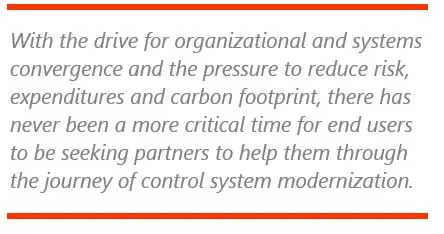

Keywords: Digital Transformation, IT/OT Convergence, Operational Resilience, Safety IIoT, OTS, Digital Twin, Cloud, Predictive & Prescriptive Analytics, AR/VR, AI/ML, Edge, Lean Control System Modernization, Power, Automation, ARC Advisory Group.
Automation and control system modernization remains one of the major issues faced by manufacturers. These legacy systems  often don’t meet the requirements for cybersecurity protection, or the ability to leverage technologies, such as AI/ML, digital twin, edge computing, cloud computing, advanced process control, predictive and prescriptive analytics, AR/VR, and remote and autonomous operations. End users are primarily concerned with preserving their installed plant assets to reduce risk, prevent or minimize any possible unscheduled downtime, as well as increasing organizational efficiency by consolidating its automation and electrical systems and personnel.
often don’t meet the requirements for cybersecurity protection, or the ability to leverage technologies, such as AI/ML, digital twin, edge computing, cloud computing, advanced process control, predictive and prescriptive analytics, AR/VR, and remote and autonomous operations. End users are primarily concerned with preserving their installed plant assets to reduce risk, prevent or minimize any possible unscheduled downtime, as well as increasing organizational efficiency by consolidating its automation and electrical systems and personnel.
Organizational and systems convergence, the pressure to reduce risk, expenditures and carbon footprint, plus other factors are driving end users to seek out solutions to help them modernize their control systems.
Global economic pressures are drastically increasing the need for companies to respond faster and become agile to be operationally resilient and thrive in this new world. This is accelerating the need to reduce risks, protect against failures, ensure product fulfillment, and protect personnel, while leveraging enhanced security architectures. This is why digital transformation, such as the incorporation of technologies such as AI, is so essential to enable solutions that drive faster business value. Digital transformation is changing the way people work, simplifying processes, connecting teams, adding visibility to data, and boosting business agility. Digital transformation is now an essential part of any control system, but cannot be fully leveraged without control system modernization. And especially in these times, if end users don’t have a digital transformation strategy yet, they will not have the flexibility and agility to maintain a competitive advantage in today’s new normal.
Cloud infrastructure provides an essential foundation to host the necessary digital transformation software tools, enabling teams to leverage information and construct digital twins. Digital twin technology allows for the efficient building of digital models of complex assets and processes. It also complements the use of technologies, such as augmented reality for engineering, operations and maintenance, as well as virtual reality for operator training and advanced operations. The result of adding digital twin technology to production processes is reduced product variability, improved performance, and reduced production risks and downtime. Again, control system modernization is essential for end users to be able to leverage the digital twin and all its functionality.
Digital twins are essential from engineering to operations, and are key for asset management. Digital twins are used for designing and building simulation applications as well as for operating and maintaining real-time applications. The benefits of digital twins, especially when used in project applications, such as virtual commissioning and training, include shorter project duration, far less rework, and improved uptime, throughput and capacity, quality and yield, and energy utilization. In addition, the benefits to the workforce also include improved operator skills and competency, especially when used in performance applications, such as predictive maintenance, process optimization, and energy management.
ARC Advisory Group clients can view the complete report at the ARC Client Portal.
Please Contact Us if you would like to speak with the author.
Obtain more ARC In-depth Research at Market Analysis

